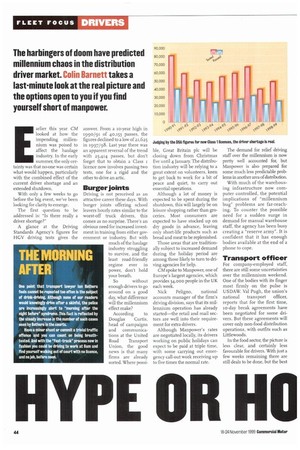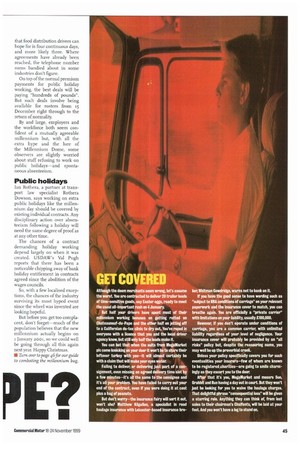HY P E O R HO
Page 46

Page 47

If you've noticed an error in this article please click here to report it so we can fix it.
PE?
The harbingers of doom have predicted millennium chaos in the distribution driver market. Colin Barnett takes a last-minute look at the real picture and the options open to you if you find yourself short of manpower.
Earlier this year CM looked at how the impending millennium was poised to affect the haulage industry. in the early summer, the only certainty was that no-one was certain what would happen, particularly with the combined effect of the current driver shortage and an extended shutdown.
With only a few weeks to go before the big event, we've been looking for clarity to emerge.
The first question to be addressed is: "Is there really a driver shortage?"
A glance at the Driving Standards Agency's figures for HGV driving tests gives the answer. From a Io-year high in 1990/91 of 40,153 passes, the figures declined to a low of 21,625 in 1997/98. Last year there was an apparent reversal of the trend with 25,414 passes, but don't forget that to obtain a Class licence now involves passing two tests, one for a rigid and the other to drive an artic.
Burger joints
Driving is not perceived as an attractive career these days. With burger joints offering school leavers hourly rates similar to the worst-off truck drivers, this comes as no surprise. There's an obvious need for increased investment in training from either government or industry. But with much of the haulage industry struggling to survive, and the least road-friendly regime ever in power, don't hold your breath.
So without enough drivers to go around on a good day, what difference will the millennium effect make?
According to Douglas Curtis, head of campaigns and communications at the United Road Transport Union, the good news is that many firms are already sorted. Where possi ble, Great Britain plc will be closing down from Christmas Eve until 4 January. The distribution industry will be relying to a great extent on volunteers, keen to get back to work for a bit of peace and quiet, to carry out essential operations.
Although a lot of money is expected to be spent during the shutdown, this will largely be on leisure shopping rather than groceries. Most consumers are expected to have stocked up on dry goods in advance, leaving only short-life products such as bread and meat to be replenished.
Those areas that are traditionally subject to increased demand during the holiday period are among those likely to turn to driving agencies for help.
CM spoke to Manpower, one of Europe's largest agencies, which provides 34,000 people in the UK each week.
Nick Peligno, national accounts manager of the firm's driving division, says that its millennium operation has already started—the retail and mail sectors are well into their requirement for extra drivers.
Although Manpower's rates are negotiated locally, its drivers working on public holidays can expect to be paid at triple time, with some carrying out emergency call-out work receiving up to five times the normal rate. The demand for relief driving staff over the millennium is now pretty well accounted for, but Manpower is also prepared for some much less predictable problems in another area of distribution.
With much of the warehousing infrastructure now computer controlled, the potential implications of "millennium bug" problems are far-reaching. To counter the possible need for a sudden surge in demand for manual warehouse staff, the agency has been busy creating a "reserve army". It is confident that it has enough bodies available at the end of a phone to cope.
Transport officer
For company-employed staff, there are still some uncertainties over the millennium weekend. One of the bodies with its finger most firmly on the pulse is US DAW. Val Pugh, the union's national transport officer, reports that for the first time, io-day break agreements have been negotiated for some drivers. But these agreements will cover only non-food distribution operations, with outfits such as Littlewoods.
In the food sector, the picture is less clear, and certainly less favourable for drivers. With just a few weeks remaining there are still deals to be done, but the best that food distribution drivers can hope for is four continuous days, and more likely three. Where agreements have already been reached, the telephone number sums bandied about in some industries don't figure.
On top of the normal premium payments for public holiday working, the best deals will be paying "hundreds of pounds". But such deals involve being available for rosters from 15 December right through to the return of normality.
By and large, employers and the workforce both seem confident of a mutually agreeable millennium but, with all the extra hype and the lure of the Millennium Dome, some observers are slightly worried about staff refusing to work on public holidays—and spontaneous absenteeism.
Public holidays
Ian Rothera, a partner at transport law specialist Rothera Dowson, says working on extra public holidays like the millennium day should be covered by existing individual contracts. Any disciplinary action over absenteeism following a holiday will need the same degree of proof as at any other time.
The chances of a contract demanding holiday working depend largely on when it was created. USDAW's Val Pugh reports that there has been a noticeable chipping away of bank holiday entitlement in contracts agreed since the abolition of the wages councils.
So, with a few localised exceptions, the chances of the industry surviving its most hyped event since the wheel was invented are looking hopeful.
But before you get too compla cent, don't forget much of the population believes that the new millennium actually begins on January 2001, so we could well be going through all this again next year. Happy Christmas.
• Turn over to page 46 for our guide to combating the millennium bug.
THE AFTER
One point that transport lawyer lair Rothera feels cannot be repeated too often is the subject of drink-driving. Although none of our readers would knowingly drive after a skinful, the police are Increasingly alert to 'morning after the night before" syndrome. This fact is reflected by the steady increase in the number of such cases seen by Rothera in the courts.
Have a minor shunt or commit a trivial traffic offence and you can count on being breathtested. And with the "fast-track" process now in fashion you could be driving to work at Barn and find yourself walking out of court with no licence. and no job, before noon.
















































































































